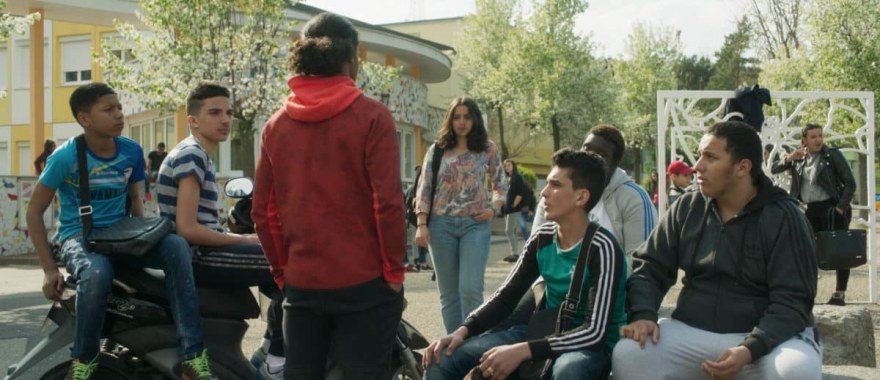[:fr]Goûter avec Bye bye les puceaux
An interview with Pierre Boulanger, director of Bye bye les puceaux (Bye, Bye Virgins)
How did you come up with the idea of exploring the relationship between Inès and Abdel?
In the film, Inès and Abdel are two teenagers. They’re strangers to each other and their worlds and personalities are incompatible. While the difference of the sexes tends to soften when we’re adults, it’s very pronounced in teenagers. So putting a young boy and a young girl opposite each other in an unusual situation makes room for that gap. You can talk about many things, especially different fears, desires, the position of the outsider, and so on… I chose to make a film about the “awkward age” because it’s temporary and that’s why we can’t judge it. That awkwardness is the basis for the humor, and making a film with teenagers offers a lot of possibilities for comedy.
Can you tell us a bit more about the place where you filmed?
We filmed in Saint-Étienne in the Cotonne housing project which is a very pleasant neighborhood. I was taken by the very clear meshing of young and old, and I immediately got on well with the residents… Aesthetically, I was looking for a clear housing project that wasn’t over the top, and it was ideal that Cotonne offered numerous perspectives from its position on a hill overlooking the city.
How did the casting and choice of actors proceed?
It’s not easy to build a group from scratch. I began with raw casting. I would go stand outside schools looking at the students, trying to find the characters’ different personalities. I needed a uniform, yet eclectic, group. That took time. I decided to surround myself with other kids from the organization 1000 Visages whom I worked with because I got tired of being taken for a cop or a pedophile… Eventually, Christine Barras, the casting director, and her assistant Lucie Mallet, helped me out and found the last actors in Paris, while Raphaëlle Bruyas took care of finishing the casting on location in Saint-Étienne.
Can you tell us about your future projects?
I’m working on several projects, including a documentary on male/female relationships, and a short film – a portrait of a female lawyer – that makes us think about our connection to reality.
What sort of freedom would you say the short format allows?
But what is freedom? The short form condenses script writing so much that I’m not sure it provides any specific freedom. Freedom is more evident in the easier conditions for financing and producing short films. In some of the self-produced films I’ve been able to make, I’ve found a sort of freedom in the fact that I’ve owned no one anything, but more importantly in the impression I have of making a cinematic image of a gesture all at once. That’s connected to the fact of creating a super light device that allows you to move forward toward visceral, instinctive expression, which is more akin to a brush stroke that a painter leaves on the canvas. When you seek validation as a filmmaker (and sometimes you have to), you don’t only follow the expectations that dictate tone and what is good and what must be appreciated: you also control yourself, you norm yourself, you become predictable and boring. You have to have the courage of your freedom!
If you’ve already been to Clermont-Ferrand, could you share with us an anecdote or story from the festival? If not, what are your expectations for this year?
Finding the woman of my dreams as a second thought perhaps, and meeting script writers whom I can collaborate with and production companies that really follow a director from the beginnings of their films all the way to the end. I also hope to interact more broadly with the audience. That’s why I’ll be there.
Bye bye les puceaux is part of National Competition F4.








